- Home
- Nevil Shute
Complete Works of Nevil Shute Page 11
Complete Works of Nevil Shute Read online
Page 11
He didn’t answer directly; in the dim light of the cabin I thought I saw him looking at me curiously. “I wonder what brought you into this?” he said at last. “It might have been anyone.”
He roused himself. “I’ve changed my mind. I’m not going to cut off abroad. I’m taking your advice.”
“My advice?” I said vaguely.
“I’m giving myself up to the police.”
It was nearly dark outside. Framed by the coaming of the hatch, I could see the stars beginning to show in a deep blue evening sky, without a cloud. There would be a moon presently, I thought.
“I’m damn glad to hear it,” I said. “When are you going to do it?”
“The sooner the better,” he replied. “Before they get me — they must be on my track by now. Perhaps tomorrow — or the day after. I’ve done all that I wanted to now — all except the one point that isn’t clear. Anyway, I’ve got enough information now to break Roddy and his crowd if ever they try to run another cargo.”
I think I was very patient. All I said was: “Who the hell may Roddy be?”
“Rodrigo Mattani,” he said quietly. “My stepbrother.”
He leaned back into a corner of the settee and began to talk. I close my eyes and I can see him now through a haze of smoke against a background of charts, blankets, and flannel trousers, half seen in the dim light from the cabin lamp, pale, tired, and a little bitter. I don’t know what I had expected to find at the bottom of this business — Romance, Adventure perhaps — I can’t say. I only know that whatever I had expected, I was disappointed.
He told me that his mother had been a Fortescue, and had married a Baron Mattani. There was one child, Rodrigo, born in Milan about forty years ago. The Baron died a year or so later, and his wife went on living quietly in her palazzo in Milan till Antony Compton sought her out and married her. Then the trouble started. It had been the father’s wish that his son should be brought up as an Italian and a Catholic; Compton was neither and the Baroness’s Catholicism was nothing to write home about. What happened was inevitable. Rodrigo was left largely in the care of the Italian relations, paying occasional visits to his mother in England; the Baroness returned to the country that she never should have left. Compton himself was born, and a sister who was married. His father and mother were still alive and lived somewhere in Surrey, not very far from Guildford. He said that they were very old.
It was a common enough story of a mixed marriage. There was nothing romantic about it, nothing to stir one up, merely rather a pitiful story of misunderstandings with the foreign relatives, of irreconcilable points of view. Estrangements grew up as they were bound to do, till at the outbreak of war they were lucky if they heard of Rodrigo once in six months. He was a journalist in Milan.
“He carried a fiery cross all the war, Dago fashion,” said Compton, a little sardonically. “You know the way they carry on. He was in the ranks, of course — the infantry. I believe he did damn well, as a matter of fact. But Lord — the stuff he used to write! He was the star turn of his paper and they gave him space for as much patriotic drivel as he could hock up. They made him editor while he was at the Front — the silly mutts. You never saw such drivel....”
He mused a little. “It was all about Italia Irridenta, and Avanti — Bravissimo — all the rest of it. You know how they go on.”
Mattani, it appeared, had been with D’Annunzio in Fiume after the war, but it was under Il Duce that he found his destiny. He was useful to Il Duce and became a Ras. I wondered how he was useful, but Compton enlightened me only by his silence. Certainly, in Mattani Il Duce found a man of exceptional ability, considerable wealth, and peculiar resources. He was the owner of a little tramp steamer and used to run cargoes regularly from Genoa across the Atlantic, cargoes of wines and spirits for the consumption of our thirsty brethren across the way.
It would have been better if his enterprise had stopped at alcohol. A bootlegging organization, however, once set up, can deal with other commodities than alcohol; from the first Mattani found himself dealing with a considerable passenger traffic of those who were prepared to pay treble fare for the privilege of entering the United States by the back door. Moreover, very soon he found himself conducting an increasing and profitable trade in several varieties of dope.
I don’t know what it is about dope, but it gets me just where I live. I don’t know if it was always like that; I think I always had the wind up of the stuff even before I saw what it did. I dare say that’s instinctive, but — there was a Flossie that I used to take about a good bit just after the war. A most awfully pretty kid. I’d never seen it in action before, and I had no idea that she was taking it till she tried to pass it on to me. That is an old story now, and one that I don’t much care about remembering — and one, I dare say, that the Belgian doesn’t care about remembering that I threw clean through the window of Les Trois Homards on to the roof of a taxi-cab out in the street, and his dope after him. If I’d known that it was going to kill her in the end I’d have — I don’t know what I’d have done. But I never saw him again.
I don’t know when it was that it occurred to Mattani that England wanted dope just as badly as America, but he had already run two cargoes into England when Compton got wind of the business. He told me that he had tumbled on it while he was in Genoa on business of his own, quite by chance. There was no secret in Genoa about the destination of the little tramp with the peculiar equipment of lifeboats and davits — two whacking great motor boats each as big as a Navy pinnace, each with a couple of hundred horse-power in her. The Genoese were rather proud of the venture and used to stand about in a little crowd on the quay watching the cranes loading the stuff into her, perhaps in the faint hope that they might one day drop one of the crates and break it open. He learned in Genoa that the vessel sometimes made a detour from the true course for America, but it was left to Mattani himself, in an expansive moment, to let his stepbrother into a portion of the secret of the new enterprise. One of his golden rules, apparently, was never to tell the whole truth to anyone, and all that Compton really learned of any consequence was the name Marazan. There, Mattani told him, it was transhipped and taken to England in a way that was — oh, so clever. Just like that.
That was all he learned. He told me how he went back to England, to his home near Guildford, to tell his mother all the news of Roddy that he thought it was good for her to know. He digressed a little here, and talked for what seemed a long time about a bit of land behind their house that they wanted to buy in order to prevent their view of the Downs from being built up. And then he went rambling on, and told me how he took the car one Sunday morning and went off by himself over the Hog’s Back towards the south, desperately worried about Roddy. It was a perfectly corking spring day, he said, one of those fresh sunny days with a pale sky when the country looks simply wonderful. He said he went on without bothering much about where he was going to till he found himself in Winchester, dropped into the Cathedral and out again, and had a very good lunch at one of the hotels. Then he went on and struck up over the Downs to the east, and so on till he got to Petersfield, where he had tea, and so home over Hindhead to Guildford in time for dinner. And so, he told me, after dinner, when his father and mother were playing piquet, it was easy for him to sit down and write to Roddy to tell him that he’d got to leave England alone for the future.
He said that after that drive it was easy, but he must have known at the time that it would mean — well, trouble of some sort. He said that at the time he didn’t care, and I think that was true. But his letter was a threat. However courteously he may have put it, and I have no doubt that he was very tactful, it could hardly be interpreted as anything but a threat to lay information that would serve to locate a coastguard at Marazan. And — one did not threaten Mattani.
He never got an answer to that letter, but within three weeks he was in prison on a charge of embezzlement. He was very reticent about that; I think he thought that I disbelieved him, for he d
idn’t even say that it was a put-up job. I went into that in some detail later, but I found out very little. He had been in the habit from time to time of borrowing money from his office till it was convenient for him to cash a cheque, an imprudent proceeding that put him well within the reach of the law. The sums involved had seldom exceeded ten pounds and had always been replaced within a few days, till the three thousand was found to be missing. They traced it through his account and produced his cheque drawing it out again. And that was that. It may be that his defence was hampered by some consideration for his mother — I don’t know. They never put their hands on the money. I think myself it was a put-up job. I think he knew it was.
Quite abruptly, he began to tell me about his meeting with Mattani in Leeds. I think that even then he was a little suspicious of me, a little suspicious that if he were to tell me too much I might take matters into my own hands. I never learned how it was that he had heard in prison that Mattani was coming to England, or how it was that he got into touch with him in Leeds. It is certain that there was a far wider organization concerned in the distribution of the drugs than we ever managed to trace out. Compton had met Mattani in Leeds only two days before, while I had been beating about off the Lizard. I never managed to fill in the account of how he had spent the intervening days, but I know now that the meeting with his stepbrother in Leeds was arranged through the medium of a retired butcher who lived in considerable comfort in Surbiton. We persuaded the butcher to tell us that later.
He met Mattani at diner in the Station Hotel, Leeds.
I have often tried to picture this man Mattani to myself, tried to imagine what he was like to deal with. The one outstanding feature about him seems to have been his great personal charm of manner.
“If ever you have anything to do with Roddy,” said Compton, “you’ll find him very pleasant to deal with. Very pleasant ... very good company. I’ve tried him pretty far, I suppose, but he’s always been the same. One can depend on Roddy in that way. It almost reconciles one to him....”
Joan tells me much the same. She met him once or twice as a young man before the war when she was a child, and her childish memories give me a further clue to the man. She describes him as slight and pale, very pleasant but very dominating, so that she was always a little afraid of him. She remembers that he was intensely enthusiastic about Italy, and that he had an ingenious parlour trick of carving a swan out of a piece of cheese for her amusement. That is all that she can remember about him, and it is little enough to go upon. I met him once myself, but not to speak to.
I don’t really know what Compton hoped to gain by meeting Mattani. It seems to me that he must have known the character of the man, have known that he was up against stronger forces than himself. I doubt if he really knew what he hoped to gain himself. I think perhaps he thought that he could induce his stepbrother to clear out of England — I think he may have been as foolish as that. I cannot think that he was so foolish as to threaten Mattani, but the threat was implied and he had sufficient information in his hand at that time to put it into execution. There is very little doubt of that. I think perhaps he may have spoken about their mother.
Mattani, he remarked, was very glad to see him. He was full of concern for his welfare, for his plight as an escaped convict. There must have been a quiet play of implied threats here, I think, for Mattani had only to speak to the waiters to see Compton arrested on the spot. However, he passed over any little incidents of the moment that might have caused unpleasantness between them, and busied himself with proposing plans for Compton’s future.
One can see the way he worked. Compton was an escaped convict, Mattani one of the very few men in the world who could get him out of the country and start him again in life, under a secure protection. He was very genial, it seems, very optimistic. He said that there was a post in Italy that lay within his gift, that really should be filled by an Englishman, that would suit Compton down to the ground. He was to be an Inspector of English in the Italian national schools. Mattani would see that any unpleasantness with the English police was safely laid to rest and Compton should be in Italy within a week, entering upon his new job in the Department of Instruction at a salary of twelve hundred a year sterling. He would live in Rome. For the time being he could camp out in a suite of rooms on one of Mattani’s palazzi; that was, until he married. Italy was a pleasant country to live and work in, said Mattani — far pleasanter than Leeds. It was also a pleasanter country to marry in.
I expect it took Compton a little time to catch the drift of all this. However, it seems that when he realized what his stepbrother was proposing, his answer came bluntly to the point. He said that he didn’t want to go to Italy and he wasn’t going. As for the matter that he had come to Leeds to talk about, the dope smuggling, it would have to stop.
“You see, I told him straight out, we couldn’t possibly have that sort of thing going on in England,” he remarked ingenuously.
I gathered that Mattani had laughed, and observed that it would certainly be very pleasant for one family to have two brothers in gaol at the same time.
I think by this time Compton must have realized that he was no match for his stepbrother in the battle of wits. And there, so far as I can make out, this curious interview came to an end, with nothing accomplished. There were no witnesses of the meeting save the waiters at the hotel; so far as I can make out Mattani told nobody what had occurred. I have to search my memory, as I have searched it so many times, to recall the words and phrases that Compton used that night as he told me this story in his queer, rambling way, digressing every now and then into irrelevant anecdotes, talking away the quiet hours of darkness.
That was all his tale. He had left Leeds firm in the intention to give evidence against his stepbrother and put a stop to this smuggling of drugs. He had come to the Scillies, not greatly caring whether he was detected, resolved to give himself up to the police as soon as the one link in the chain of evidence was established. He wanted to know what it was that happened at Marazan, and that he had been unable to find out. He had fixed upon that as the salient point of the scheme; until it was discovered how the stuff reached England he could not feel that he had anything but a case of suspicion against Mattani. It was important to find out that.
He told me that Joan had offered to go to the Scillies to see the place while he was in Leeds. That was how she had come to be there; her job had been to make such tactful inquiries as she was able, particularly among the lighthouse-keepers on Round Island. I gathered that she had discovered precisely nothing. To me it was pathetic to see the way in which these two had gone about this business, so different from anything that they had had to do before. They were so helpless, so unfitted for the job. I could see clearly that Mattani could make rings round them; I have no doubt that he knew their every movement, that they were closely watched. One can see now that that must have been the case.
I told Compton about the rag and pliers that I had found on the beach, and got them out and showed them to him. He sat for a long time fingering them, turning them over in his hands, evidently trying to link them up with anything that he had seen or heard about the place. I went through into the forecastle and put on the kettle for a hot drink before turning in; it was about half past one in the morning. When I came back he had left the cabin, and I saw him standing in the cockpit. He was looking out over Marazan.
I went on deck. The vessel was lying very quietly; it was a bright moonlight night, not very cold. I had no riding-light up, and didn’t intend to set one in such an anchorage as this. I moved round the deck for a little, making all square for the night; in the course of my orbit I returned to the cockpit.
“It’s transhipment of some kind,” he said quietly. “Motorboats, of course, in one form or another. The oil shows that.”
I wasn’t quite satisfied with this. “They run a cargo tomorrow night?” I asked.
He nodded. “I want to see what happens. I want to be on White Island tomorrow nig
ht. That would be the best place, wouldn’t it?”
I thought for a moment. “There’s more cover on White Island,” I said, “but it’s probably farther away from the beach you want. They’ll land on the Pendruan beach, where I found the rag.”
“They may not come at all,” he remarked. “I may have given Roddy cold feet. But it’s worth trying.”
“I reckon Pendruan would be our best place,” I said. “But in that case we ought to get away tonight, I think. We can’t leave the vessel here — obviously.”
It was a very still night. There was practically no wind; the water lapped continuously, gently against the topsides. The moon left a dappled trail upon the water like an oleograph. I had been listening while we talked, I suppose unconsciously, to the lapping of the water at hand and to the mutter of the sea on the rocks beyond the entrance to Marazan. And now there was something mingled with the mutter.
“Hullo,” I said. “What’s the row? Listen....”
I knew what it was before I spoke. After all, it was my business to know that sort of row, and it was getting louder.
Compton turned towards the hatch. “That’s it,” he said, very quietly, as though he were answering some remark of mine. “It’s a motor-boat. And something pretty powerful.”
He slipped down into the cabin and turned out the lamp. In a minute he was back at my side. The vessel was now in darkness.
“I can’t quite spot where she is,” I whispered. “I think she’s over there.” I pointed up-wind, in the direction of the entrance to Marazan.
He waited for a moment before replying. “She’s coming from the sea,” he said calmly. He looked at his watch, glowing faintly in the dark. “Not quite full tide, as I make it. She can get through Marazan.”
“That isn’t a marine engine,” I said. I strained my ears to analyse the rumble. “It’s something big. It sounds much more like an aero engine to me. But that’s no aeroplane.”

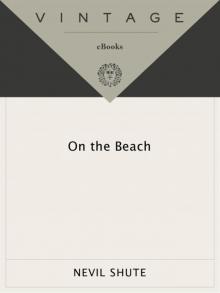 On the Beach
On the Beach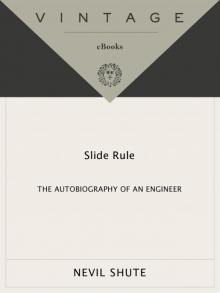 Slide Rule
Slide Rule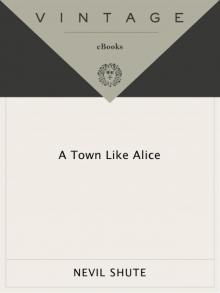 A Town Like Alice
A Town Like Alice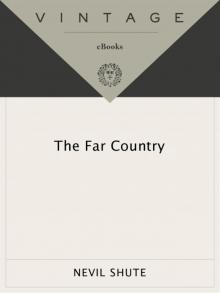 The Far Country
The Far Country Pied Piper
Pied Piper Round the Bend
Round the Bend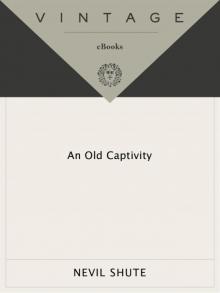 An Old Captivity
An Old Captivity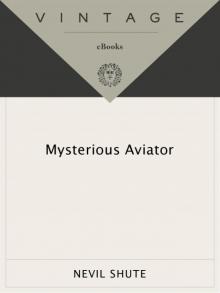 Mysterious Aviator
Mysterious Aviator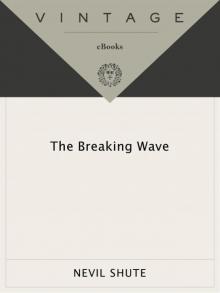 The Breaking Wave
The Breaking Wave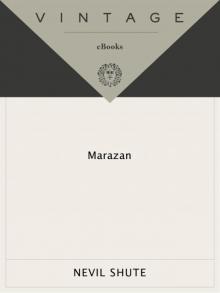 Marazan
Marazan Lonely Road
Lonely Road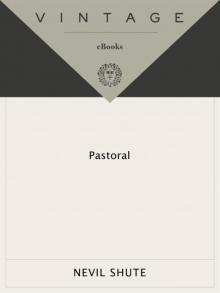 Pastoral
Pastoral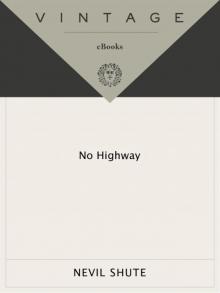 No Highway
No Highway Stephen Morris and Pilotage
Stephen Morris and Pilotage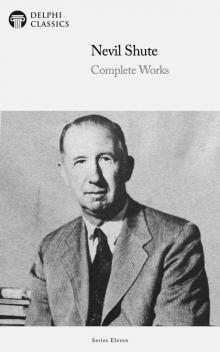 Complete Works of Nevil Shute
Complete Works of Nevil Shute Most Secret
Most Secret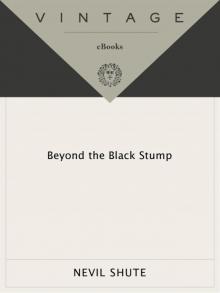 Beyond the Black Stump
Beyond the Black Stump The Rainbow and the Rose
The Rainbow and the Rose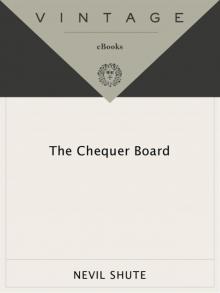 The Chequer Board
The Chequer Board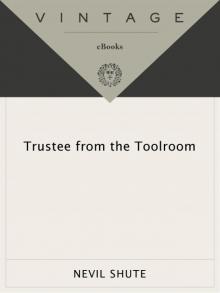 Trustee From the Toolroom
Trustee From the Toolroom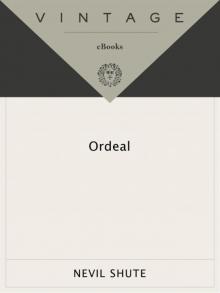 Ordeal
Ordeal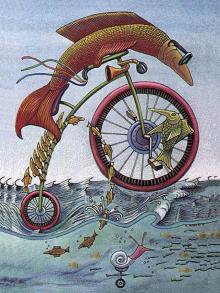 Stephen Morris
Stephen Morris